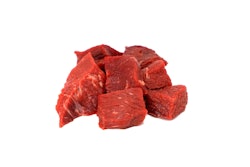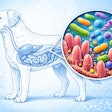
The Institute for Feed Education and Research (IFEEDER) has published a report examining U.S. reliance on China for vitamins and amino acids used in pet food, animal feed and pharmaceutical products, prompting the American Feed Industry Association (AFIA) to call for action on supply chain diversification.
Research methodology
The research, conducted for IFEEDER in collaboration with Decision Innovation Solutions and Lobo Consulting, assessed publicly available data on global vitamin and amino acid production, U.S. import and export quantities and utilization rates in domestic livestock diets. The researchers applied diet modification strategies to evaluate whether alternative feed ingredients could partially compensate for limited vitamin and amino acid supplementation.
The report showed that in some instances, farmers and ranchers could modify animal diets to mitigate the impacts of reduced vitamins or amino acids, but it would not fully resolve the negative animal health and welfare and production efficiency consequences that would result.
"IFEEDER plays a critical role in identifying key questions and delivering independent, science-based research to inform U.S. feed and pet food industry leaders," said IFEEDER executive director Lara Moody. "Proactively addressing potential supply chain threats is one of the industry's most pressing concerns. The extent of the U.S. reliance on China for vitamins and amino acids was more significant than many anticipated - underscoring the need for objective, reliable data to guide effective policy decisions before these risks escalate."
Import dependence
The report investigates several vitamins and amino acids, including vitamin A, thiamine (B1), riboflavin (B2), niacin (B3), biotin (B7), vitamin B12, vitamin D3, vitamin E, lysine, threonine, tryptophan and methionine. Data ranging from 2020 to 2024 showed that the U.S. relies on China for 78% of total vitamin imports and 62% of global amino acid production. For some vitamins, such as biotin, China produces 100% of the global supply.
The report found that an estimated 425,236 metric tons of the top four essential amino acids and 48,903 metric tons (MT) of supplemental vitamins are used in U.S. domestic livestock and poultry diets. A previous IFEEDER study that examined feed consumption data from 2023 showed that these same animal species consume approximately 250 million MT of feed annually, including varying levels of supplemental vitamins and amino acids to balance diets and sustain healthy biological processes and efficient meat, milk and egg production.
Animal health impacts
The report also examined the effects of insufficient feedstuff nutrients. The amino acid lysine ensures proper egg size, strong eggshells and healthy albumen content in laying hens. Food-producing animals that maintain adequate levels of vitamin A tend to reach market weight faster and more efficiently.
Industry response
"For years, the U.S. animal food industry has been sounding the alarm that China's growing and dominant influence in the vitamin and amino acid supply chain poses sharp food security risks for Americans, the farmers that produce our food and the animals that nourish us," said AFIA president and CEO Constance Cullman. "New IFEEDER data now makes it impossible for policymakers to ignore an alarm that has grown too loud – and too threatening – to dismiss."
AFIA will work with stakeholders on a strategy aimed at identifying and prioritizing the most vital vitamins and amino acids for urgent action. The aim is to identify pathways for the White House, Congress and industry to pursue to diversify supply chains and prevent potential future losses of agricultural capacity and food production.
"Addressing the potential supply chain threat to our food supply requires a joint industry and all-of-government approach," Cullman continued. "The animal food industry appreciates the Trump administration's and lawmakers' recent actions to discuss this critical issue and is looking forward to working together with others across the food and agriculture value chain to develop risk- and science-based solutions that promote a more reliable and stable future food and feed supply."
The full IFEEDER report is available on ifeeder.org. Additional resources, including fact sheets, animal-specific sub-reports and industry insights will be released soon.


















